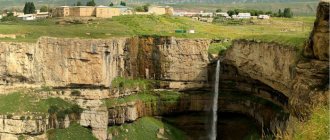Birth of a child
According to Muslim beliefs, Shaitan eagerly awaits the birth of every new person in order to lead him astray. Therefore, immediately after birth, the child is whispered the adhan (call to prayer) in the right ear, and the iqama (second call to prayer) in the left ear. Then it is recommended to lubricate the baby’s lips with date paste or any other sweet product. After seven days, it is advisable to shave the child’s head and give generous alms to those in need. The child's name can be given as early as his birthday or on the seventh day. Muslims are recommended to name their children after the names of the prophets (Muhammad, Yusuf, Ibrahim, Idris) and angels (Israfil, Raphael), as well as the names of relatives and closest devotees of the Prophet Muhammad (Fatima, Ali, Omar, Zeppab). Preferred male names also include the names , in which the word “abd” is present in combination with one of the names of Allah: Abdullah (slave of Allah), Abdurrahman (slave of the Merciful), etc.
As a sign of gratitude to God for a newborn child, it is advisable, if the parents have the financial opportunity, to sacrifice a ram on the seventh day after birth. When a girl is born, one ram is slaughtered, and when a boy is born, one or two are slaughtered.
According to the majority of Muslim scholars, before a boy reaches adulthood, it is necessary to perform the rite of circumcision (Arab, khitan; commonly used - supnat). Although circumcision is not mentioned even once in the Qur'an, it appears repeatedly in the Sunnah and has become one of the main criteria for belonging to the Muslim faith.
Muslim holiday Eid al-Adha
Muslim holidays carry meaning and history. Eid al-Adha is one of the most important holidays, celebrated on the 1st of Shawal, and consists of breaking the fast after fasting in the month of Ramadan.
The Muslim holiday of Eid al-Fitr lasts 4 days and begins with cleaning the house, yard and all premises. Afterwards the house is decorated, all family members wash and put on clean clothes. In wealthy families, it is customary to make new things both for the home and for each family member. Money for alms is also prepared for the holiday, since according to tradition, every Muslim must prepare for the holiday. On the night before the holiday, various traditional Muslim treats are prepared. In the morning of Eid al-Fitr, it is customary to eat something sweet. On the day of the holiday, children distribute sweets to their relatives, receive their treats in return, and a kind of exchange of dishes of Muslim cuisine takes place. On this day it is customary to be friendly.
Prayer is held in the mosque; before prayer, wealthy Muslims make a special donation for each of their family members and for servants.
After the prayer, people go to the cemetery to remember their deceased relatives.
The city hosts celebrations and fairs.
During the post-fasting period, Muslims often gut their geese, and part of the resulting meat is distributed to the poor.
Marriage
Before entering into a marriage, a conspiracy or matchmaking (hitba) must be arranged. The groom himself or through a proxy proposes to the father or guardian of the bride. At the same time, the parties agree on the property allocated by the husband to the wife, and other conditions that are included in the marriage contract. Next, the bride is transferred to the groom’s house, where a wedding celebration (valima) is held, during which the marriage contract is announced and mahr is paid, in whole or in part. Marriage is considered accomplished after the actual entry of a man and a woman into marital relations (pakah). The obligatory conditions of marriage are the payment of mahr, maintenance of the wife, treatment of her according to the social status of her family, performance of marital duties and maintenance of children.
Religious traditions
One of the primary religious traditions of Muslims is the obligatory performance of a special prayer - namaz - five times a day. In addition, every Friday a Muslim must visit a house of prayer (mosque). You should enter the mosque by taking off your shoes, while women should have their heads covered with a scarf, and their clothes should completely cover their legs.
There are only two religious holiday dates in the Muslim calendar: the holiday of sacrifice, Kurban Bayram, and the holiday of breaking the fast, Ramadan Bayram. Ramadan Bayram is celebrated on the first day after the end of a month-long fast, which involves abstaining from food, drink and sex, repeated daily prayers and compliance with the Koranic requirements regarding work. The founder of the religion, Prophet Muhammad, forbade participation in non-Muslim holidays.
During Ramadan Bayram and Kurban Bayram, believers read the Koran, distribute donations, and try not to offend anyone. Since religious holidays are celebrated according to the lunar calendar, the dates of holidays according to the Julian calendar change every year. Friday (Juma) is also considered a special day in the Islamic calendar. Just as Christians have Sunday and Jews have Saturday, so for Muslims Friday is a day of rest.
Hajj is considered a traditional religious obligation in Islam: a visit to the holy city of Mecca and Mount Arafat and the Muzdalifah Valley located in its vicinity. The pilgrimage must be made at least once in a lifetime, and is considered one of the best, from the point of view of Islam, actions of a true follower of Muhammad.
Funeral
Although funeral rites in different Muslim countries differ from each other, there are basic rules that are followed almost everywhere. Feeling the approach of death, a Muslim must say the shahada (“There is no god but Allah, Muhammad is the messenger of Allah”). If he cannot do it himself, then someone must whisper the shahada in his ear. Shiites must read or listen to Surah 36 of the Qur'an, Ya Sin. Before death occurs, a Muslim is turned to face the qibla (towards Mecca), then a ritual ablution of the deceased is performed, which is usually performed by a specially hired person. After washing, the body is dressed in clean clothes or in special burial clothes, consisting of pecolage blankets. The body of a martyr, a “martyr of faith,” is not given, they bury such a peak in the clothes that were worn at the time of death, and a prayer is not read over the deceased.
Burial should be by the odd male member. The closest relatives place the body in the grave so that the face of the deceased is turned towards Mecca. The grave is made as spacious as possible, usually with a niche in the side wall or a depression at the bottom so that the deceased can sit down when the angels of death Munkar and Nakir appear. For this purpose, funeral vestments are also loosened. All these ceremonies are accompanied by the reading of surahs of the Koran. Religious authorities prohibit marking the grave in any way, although gravestones bearing the name of the deceased, dates of birth and death, and dates from the Koran are common. The deceased is commemorated on the third, seventh and fortieth days.
Calendar, holidays and special days
The starting point of the Muslim chronology is the Hijra - the migration of Muhammad and his supporters from Mecca to Medina in 622, but not the date of their arrival in the city, but the first day of the first month of the same year, which when translated into the European calendar corresponds to July 16, 622.
The Hijri calendar is based on the lunar calendar with a year length of 354 days.
The year is divided into 12 months: Muharram, Safar, Rabil-Awwal (Rabbi I), Rabi-l-Akhir (Rabbi II), Jumada al-Awwal (Jumada I), Jumada al-Akhir (Jumada II), Rajab, Sha'ban , Ramadan, Shawwal, Dhu-l-Qada, Dhu-l-Hijjah.
The lunar month lasts from the appearance of one new month to the next, in odd months there are 30 days, in even months - 29.
In leap lunar years, when the number of days increases from 354 to 355, an additional day is included in the last month of the year. In Iran, the Hijri era is calculated on the basis of the solar year with constant correspondence of dates.
The main Muslim holidays are Eid al-Adha and Eid al-Fitr. Eid al-Adha - the festival of sacrifice - begins on the 10th of the month of Dhu-l-Hijjah and lasts 3-4 days. Eid al-Adha takes place on the day of completion of the pilgrimage to Mecca, when pilgrims perform the rite of sacrifice in the Mina Valley in memory of the sacrifice of Ibrahim.
It is believed that not only pilgrims, but also every free Muslim who has the means to buy a sacrificial animal must make a sacrifice on this day (one person - one sheep). The animal must be of a certain age and have no flaws. Typically, a third of the meat goes to the holiday meal, and the rest is distributed to the poor.
Eid al-Fitr - the holiday of breaking the fast in honor of the end of fasting in the month of Ramadan - begins on the 1st of the month of Shawwal and lasts 3-4 days. On the first day of the holiday, as well as on the first day of Eid al-Adha, a special festive common prayer is performed. The rituals of Eid al-Fitr include a festive meal, giving alms to the poor, and it is also customary to visit friends and give gifts.
Traditionally, it is considered necessary to visit the graves of ancestors on these days. People spend a lot of time in cemeteries, often staying there overnight in special tents. They distribute food to the poor, decorate graves, read verses from the Koran or hire a person to read.
The night of the 27th day of the month of Ramadan, when, according to Muslim tradition, the first revelation was sent down to Muhammad, is celebrated by believers as Lai-pat al-qadr (Night of Predestination). It is, as the Koran says, “better than a thousand months.” It is customary to spend Laylat al-Qadr in the mosque, reading the Koran and offering prayers and requests to Allah and the angels.
But in many Muslim countries, on the 27th of the month of Rajab, the holiday of Miraj is celebrated - the night ascension of the Prophet Muhammad. According to tradition, one day, when Muhammad was sleeping near the Kaaba, the angel Gabriel appeared to him with the winged mount Burak (brilliant, lightning-fast), on which the prophet first went north and visited Hebron and Bethlehem, and then arrived in Jerusalem on Mount Moriah. On the night of the 27th Rajab, Muslims are required to read the Koray, pray and retell to each other the tradition of the miraculous ascension of the prophet, and on the day of the 27th Rajab, fast, which is ritually equivalent to 60 months of fasting or 100 nights of fasting and 100 nights of prayer.
Maulid - the birthday of the Prophet Muhammad - is celebrated on the 12th of Rabi al-Awwal. This holiday, which is not mentioned either in the Koran or in the Sunnah, was not recognized for a long time by many Muslim theologians, who declared Mawlid an “innovation” (bida). However, over time, the tendency to glorify Muhammad prevailed and, despite harsh criticism, the holiday was established as an “approved innovation” (bida hasana).
The first night from Thursday to Friday of the month of Rajab is called Ragaib (dreams, desires). It is believed that on this night a large number of angels descended on the Prophet Muhammad, and Allah showed great mercy to his messenger. On this night special “prayers of the gifts” are read.
Friday (ju-ma) is also considered a holiday, when healthy and free adult Muslims must gather in the mosque to conduct midday Friday prayers and listen to the sermon. Tradition says that the Day of Judgment will fall on a Friday, that Muhammad and his son-in-law Ali were born on a Friday, and that the “light of Islam” began to spread on Friday. In many Muslim countries, Friday is an official day off.
Muslim shrines
The main holy place of Islam is the Meccan Kaaba, located in the center of the main mosque of Mecca (Masjid al-Haram). According to Muslim legends, the first tent over the “black stone” was erected by Adam, and the Kaaba itself was erected by his son Shis. During the flood, the Kaaba was lifted into the air, then it collapsed, and when Ibrahim settled his son Ismail in Mecca, Allah ordered the prophet to restore the foundation of the Kaaba.
The holy cities also include Medina, where the first mosque appeared, and Jerusalem, where the Masjid al-Aqsa mosque (the Outermost Mosque), one of the most important shrines of Islam, is located. It is believed that Masjid al-Aqsa was built on the spot where, according to the epic legend, Muhammad was transported during a night journey with Jibril.
One of the main shrines of Shiite Muslims is the city of Karbala in Iraq, located 102 km from Baghdad. It houses the tomb of the third Shiite imam Husayn, his brother Abbas and 70 of their devotees, who died here in 680 in an unequal battle with the Umayyad army. The city of Mashhad in northeastern Iran is also revered by Shiites all over the world, where the tomb of the eighth Shiite imam Ali ibn Mussa ar-Rida, who died in 818, is located.
Spheres of Muslim traditions
The traditions and customs of Muslims are largely related to the sphere of family and everyday life, and therefore Islam attaches great importance to the observance of all rituals that relate to events such as weddings or funerals.
- One of the most important religious traditions of Muslims is visiting a mosque to perform namaz, that is, prayer. Allah Almighty has prescribed His worship as a primary obligation for all Muslims. A person professing Islam must worship the Almighty five times during the day, and it is better if he does this in a mosque. But visiting the mosque daily is not a requirement for a Muslim.
- There is a day that is traditionally reserved for visiting the mosque - this is Friday. When entering the mosque, you must remove your shoes. It is also the custom for Muslim women to wear a headscarf and dress in accordance with Shariah norms for Muslim women's clothing. Women's clothing should cover their legs.
- Nikah is another tradition among Muslims - a marriage according to Islam is considered valid only if a nikah ceremony, that is, a religious wedding ceremony, was performed to establish it. During such a ceremony, the bride's guardian gives the bride in marriage in the presence of two witnesses. During nikah, it is advisable to announce the rights that men and women have in Islam when they get married. The Nikah ceremony is traditionally held in a mosque.
- Sunnat is another religious custom of Muslims, which involves circumcision of the foreskin of boys aged seven to ten years. Compliance with such a custom is prescribed by the Sunnah, which complements and explains the text of the Holy Book of Allah, the Quran. Sunnat is a characteristic of the religious and national identity of a Muslim man, and this ritual is closely connected with Muslim history.
- There are also traditions and customs associated with funerals and janaza prayer. The roots of the Islamic funeral rite go back to pre-Islamic times, when it was customary to bury the dead within 24 hours after their death. The Muslim ritual over the body of the deceased involves ablution, washing, in which camphor and incense are used. The funeral prayer is called Janazah prayer. Several people read it.
Muslim wedding traditions involve several elements common to all nations, but each country also has its own special elements. Since the cultures of different Muslim nations are constantly undergoing a process of mixing, not all Muslim nations strictly adhere to Sharia law - some of the classical laws of the religion of Islam have undergone strong changes over time.
But it was the wedding customs of Muslims that preserved the maximum number of basic Sharia laws. This is largely due to the fact that Muslims believe that the extent to which the traditions and customs of Islam are observed during the wedding ceremony determines how happy the newlyweds will be in the future as a married couple.
A beautiful traditional Islamic ritual is associated with the night before the wedding. This ritual is called “Henna Night”: on this night, henna patterns are applied to the bride’s palms and feet, this is called mehendi.











